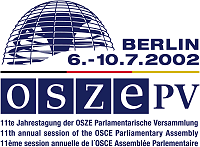
Report on the 10th Annual Session of the OSCE Parliamentary Assembly in Paris and the 11th Annual Session of the OSCE Parliamentary Assembly in Berlin
In the Charter of Paris of 1990 the heads of state and
government "call for greater parliamentary involvement in the CSCE,
in particular through the creation of a CSCE parliamentary
assembly, involving members of parliaments from all participating
States". This reflects the efforts of the participating States to
strengthen democratic momentum in the OSCE process.
At a meeting of delegations of the parliaments of the participating
States in Madrid on 2 and 3 April 1991 it was unanimously agreed to
establish a Parliamentary Assembly in the framework of the OSCE and
to hold the founding meeting of the Parliamentary Assembly in
Budapest in the first week of July 1992. At present the OSCE
Parliamentary Assembly consists of 317 parliamentarians from all 55
OSCE participating States.
The 10th Annual Session of the OSCE Parliamentary Assembly took
place in Paris from 6 to 10 July 2001. The German Bundestag sent
the following delegation: Bundestag President Wolfgang Thierse
(SPD) as head of delegation, Rita Süssmuth (CDU/CSU) as deputy
head of delegation and Vice President of the OSCE Parliamentary
Assembly, Gert Weisskirchen (SPD) as member of the OSCE
Parliamentary Assembly delegation and chair of the 3rd committee of
the OSCE Parliamentary Assembly, Gerd Höfer (SPD), Uta Zapf
(SPD), Rita Grießhaber (Alliance 90/The Greens), Hans-Dirk
Bierling (CDU/CSU), Hans Raidel (CDU/CSU), Helmut Rauber (CDU/CSU),
and Willy Wimmer (CDU/CSU).
The main topics of the conference were the improvement of
institutional cooperation within the OSCE and the important
contribution made by parliamentarians in the process of bringing
about transparency and accountability in the OSCE. A great deal of
interest was elicited by the report and resolution submitted by the
rapporteur for the 1st committee, András Bársony
(Hungary), which dealt with the possible effects of the European
Security and Defence Policy (ESDP) on the OSCE region.
The OSCE Parliamentary Assembly passed a resolution on the
abolition of capital punishment which was also supported by a
number of members of the US delegation.
The President of the Assembly, Adrian Severin (Romania), was confirmed in office for a further year by acclamation.
At its last Annual Session on 10 July 2001 the OSCE Parliamentary Assembly adopted the "Paris Declaration" on the subject of "European Security and Conflict Prevention: Challenges to the OSCE in the 21st Century". The OSCE Parliamentary Assembly also adopted eleven resolutions on the following topics:
- Strengthening transparency and accountability in the OSCE
- Situation in Ukraine
- Republic of Moldova
- Developments in the Northern Caucasus
- Combating corruption and international crime in the OSCE region
- South-Eastern Europe
- Prevention of torture, abuse, extortion or other unlawful acts
- Supporting the activity of the SECI Regional Center for Combating Transborder Crime
- Freedom of the media
- Abolition of the death penalty
- Combating trafficking in human beings
With twenty-six amendments, particularly on the topics of transparency and accountability in the OSCE, South-Eastern Europe, and the Northern Caucasus the German delegation was one of the most active at the conference in Paris. At the initiative of Vice President Rita Süssmuth key aspects of a German-Russian cooperative effort as well as key demands of the Kosovo Democracy Team were included in the final declaration.
During the final plenary session of the Assembly on 9 July 2001
Bundestag President Wolfgang Thierse thanked the hosts for having
held the conference in Palais Bourbon, the seat of the French
National Assembly. He reaffirmed his invitation to the next annual
session of the OSCE Parliamentary Assembly in Berlin, from 6 to 10
July 2002. "Terrorism - A Global Challenge for the 21st Century" is
the main topic of the 11th Annual Session of the OSCE Parliamentary
Assembly.
Committee and plenary meetings will be held in the Reichstag
Building. All 317 delegates from the 55 OSCE member States are
expected to attend the conference.
